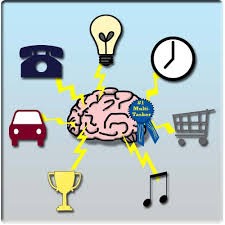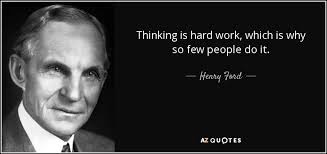THE MEMORY FILE: Part 2
Thinking & Remembering: You Can’t Have One Without The Other
Cluttered Thinking Leads To Forgetting
It’s OK To Forget (Once In A while)
Everybody forgets at one time or another. That’s normal but not excusable for a family member’s birthday or anniversary. For those of us 65 years of age and older the worry is Alzheimer’s disease. The odds of not getting it are in our favor. The reason for forgetting, for most us, of all ages, is cluttered thinking resulting in the lack of focus resulting in memory problems. The colloquial expression is scatter brained. I call it DISTRACTED FOCUS.
In my last posting of THE MEMORY FILE: PART 1, I referred to a situation most of us have experienced: We walk into another room to get something and by the time we get there we’ve forgotten what we came for. Why? What happens is that we fill our heads with a dozen other things we want to do, erasing what it was we wanted in the room.

Distracted Focus
Examples
You make your purchases at a supermarket and wait your turn in the cashier’s aisle to pay. You reach into your wallet for your credit card and, to your dismay; it’s not there. How can that be? You always keep your credit card in your wallet. Not more than twenty minutes ago you used your credit card to pay for a prescription at the pharmacy
Did you leave it at the pharmacy? Leaving your groceries you hurry back to the pharmacy. Your credit card is not there! Could it have been stolen? Not likely. You still have your wallet. What to do? You reach into your coat pocket for a tissue and, to your relief your credit card is there.
What happened? Distracted focus. There were other things on your mind. Forgetting that you had removed the credit card from your wallet you had, conveniently, placed it in your coat pocket, something you rarely do.
_______
Time to go to work. You reach for your car keys on the small table in the hallway. They are not there! How can that be? That’s where you always put your car keys. Where can they be? If you are a blamer, whom do you blame? Was it was one of the kids? You confront them and they deny touching your car keys. Who removed your car keys from the hallway table? Who do you blame? The answer is you. You had dropped your keys on the kitchen table while racing to answer the kitchen phone. This is another example of distracted focus.

An Easy Solution
It’s called speaking a reminder. How does it work? When you put something away, particularly in a seldom-used location, you say aloud I’m putting my credit card in my coat pocket or I’m putting my car keys on the kitchen table. You must do it no matter how rushed you are. It may sound silly to you but it works.
Focusing to Remember
There are two main ways we remember. I call them focused and passive. When we actively try to remember something such as an appointment or when studying for a test, remembering an address, a poem, or the names of all our relatives that is focused memorizing. I will discuss passive memory further on.
Focused memory is not easy. Our other, more pleasant, interests too often distract us. It is sometimes referred to as daydreaming or wishful thinking.
When you wish upon a star
Makes no difference who you are
Anything your heart desires will come to you
From Walt Disney’s Pinocchio

Unfortunately, that’s not the way it works in real life.
Active Memory Requires...FOCUSING AND THAT REQUIRES THINKING

That is why we sometimes forget what it was when we came into a room and forgot what it was we wanted or were going to do. We lost focus.
Remembering Requires Focus
(I Forgot What I Was Going To Say!)
At one time or another, most of us are required to commit something to memory. It begins in school and continues at all levels. Studying for tests required focusing. Studying to learn seems to be with us forever. It is not just in school studying for exams. Apply for a driver’s license and you must commit to memory questions relating to rules of the road. Speaking about rules of the road, imagine you are in your car and lost. You stop to ask directions. Here is where you must focus so that you can remember to turn right— when? Take a left at—what? Lose focus and you stay lost.
Passive Memory
“I’ll never forget as long as I live when _____.” You can probably fill in on the blank or many blanks. It begins in early childhood. Something happened out of the very ordinary to you or you as a witness when you were only three, four or five years old. Let me give you an example of such a passive memory that has been with me almost all my life:
Falling Down the Rabbit Hole? No! -- Falling Down the Airshaft. Yes!
The year was 1933. I was four and one half years old. My brother was three years old. The two of us found ourselves in the dimly lit attic of our grandparent’s home. Why were we there, alone? To this day I cannot say. Counting the attic and the cellar, we were four stories high. An attic airshaft went down to the cellar ceiling four stories below. (My passive memory continues.) My brother was small and somehow in that dimly lit attic managed to fall into the airshaft. He fell four stories.
My memory of that happening is vivid. My brother’s overalls had hooked on two nails leaving him dangling from the cellar ceiling. He was frightened but unhurt. I remember my uncle standing on a cinderblock freeing my brother.
That my friends is an example of an early childhood, passive memory.
______
A Reminder From The Memory File: Part 1
Memory is about storage and retrieval. Think of your brain (part of it) as a file cabinet in which you store (consciously and subconsciously) information such as names, addresses, where you put your keys, how to drive an automobile, who you once loved or disliked, past events...all that kind of stuff. All references are to the healthy brain.
When We Suffer From Lazy Thinking
Serious thinking can be hard work. How can we commit to memory something difficult that requires our intense focus? (There’s that word again.) It is for that reason studying, almost at any level, school or work, can be difficult and unpleasant for many people. There is a way around it.
Mental Word Pictures
What is a mental word picture? You want to remember the name of a person or place. You know you will have forgotten it in no time. What to do? Using your imagination (This can be difficult at first.) create a picture in your mind using the subject you want to remember. For example: You have just been introduced to Jim Baker and want to remember his name. Create, in your mind, the silliest mental picture of Jim Baker. How about Jim Baker wearing a chef’s hat lifting weights in a gym? You can even go sillier. How about a baker removing bread from an oven with jam on it? “Jam Baker” is not far from the name to be remembered. I will go into more details in creating mental pictures that work in later MEMORY FILES. Watch for them.
That’s all well and good but how about studying and not remembering? Learning by heart.
This is a subject to be covered in later editions of THE MEMORY FILE.
______

Age Is No Excuse
It’s the luck of the draw not old age that affects our memory. Mental impairment happens at all ages, more so as we age. Aging, however, is no excuse. I will be ninety years old next year. More reason to write and be creative. Remembering and forgetting are part of the aging equation but not hard thinking. As Henry Ford once said: “Thinking is hard work--”. Those that do the hard thinking are in a better place for a successful life, at all ages, than those that don’t. It’s never too late to start.
***
Coming soon:
THE MEMORY & RECALL HANDBOOK
(A handy guide to help you remember.)
Remembering Can Be Easy—If You Know How
Coming next:
THE MEMORY FILE: PART 3
Dealing With Your “Bad” Memories—They Can Affect Your Life
Remember, We are at
awritersghosts.com